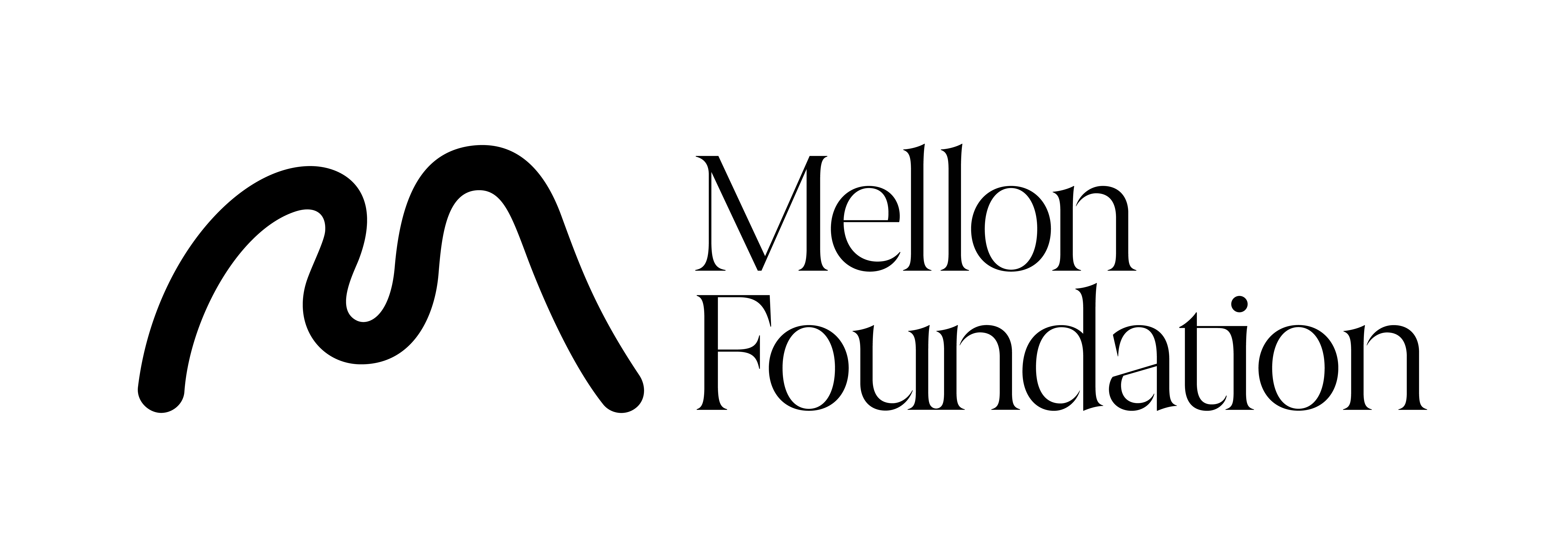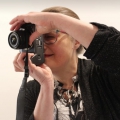A note for attendees: we strongly recommend bringing a laptop to this event, as we will be working on projects in real time. If you don't currently have access to a laptop, you can borrow one at Hillman.
Welcome, Overview, and Objectives
Land Acknowledgement
Schedule Details
Schedule Summary
Wednesday, May 1
William Pitt Union Room 548
8:30 am – 9:30 am // Breakfast
9:30 am // Welcome and Introductions
10am // Session 1 // "Creating Public-Facing, Non-Traditional Scholarship & Making a Living With Your PhD" - Alex Galarza
11am // Public-facing and nontraditional scholarship discussion and hands-on workshop session
12pm // Lunch
1pm // Session 2 // Humanities Engage Career Allies Roundtable
2pm // Diverse career and skillset development discussion and hands-on workshop session
4pm // Reception // Oaklander - Charles Room (4:30pm to 5:30pm)
Thursday, May 2
William Pitt Union Room 548
8:30 am // Breakfast
9:00 am - 12:00 pm // Session 3 // Teaching Innovation Presentation + Workshop
12:00 pm // Lunch
1:00 pm // Session 4 // "Integrating Professional Development into Graduate Curricula" + workshop - Stacy Hartman
- 3:30 pm: Wrap-up Session and Post-Workshop Survey
Welcome!
Humanities Engage fosters a culture change in how arts and humanities departments, faculty, and doctoral students in the Dietrich School of Arts and Sciences envisage the broader importance of humanities Ph.D.s and the societal impact of humanistic training. This project was developed with generous support from the Mellon Foundation.
To make the full spectrum of postdoctoral humanistic careers visible, valued, and viable, we are committed to
- understanding Ph.D. students’ career objectives and the actual career outcomes of doctoral alumni
- supporting all doctoral students as they continuously evaluate their educational and professional goals, skills, and needs, and pursue flexible pathways toward timely completion of degrees
- emphasizing the overlaps between superb preparation for humanists’ careers within and beyond academia
- improving the quality of postdoctoral outcomes across sectors as well as increasing completion rates of diverse cohorts.
As we train the next generation of scholar-teacher-leaders within and beyond the classroom and academy, we seek to make the humanities more fully integral to tackling the complex challenges facing an interconnected yet divided world.
Funding through this Mellon grant supports the design and implementation of discipline-based and interdisciplinary curricular changes across humanities doctoral programs, an ambitious immersive fellowship program across non-profit, public, and corporate sectors, and modernizing the culture of doctoral advising and mentoring.
The 2024 Summer Workshop is designed to promote the primary functions of Humanities Engage: the advancement of the public-facing humanities, curricular innovation, and cultivating versatile skillsets for doctoral students.
Humanities Engage has identified the following target outcomes for this workshop.
Doctoral students will complete this workshop with one or more of the following:
-
A working outline for a small, public-facing project proposal
-
A concept for a piece of nontraditional scholarship within their research area
-
An innovative classroom plan (an assignment idea, a lesson plan, or an outline for a Humanities Engage Curricular Development project)
-
A plan for a Humanities Engage Pitch Your Own Immersive project or an informational interview request
Faculty will complete this workshop with one or more of the following:
-
A working abstract for a Humanities Engage Curricular Innovation Project (graduate faculty) or a proposal for collaboraitng with a graduate stuent on a Humanities Engage Curricular Development project (non-graduate faculty)
-
A proposal for an addition to or expansion of existing departmental professionalization or career readiness programming for doctoral students
-
A partial rubric for evaluating nontraditional scholarship in their field
-
Specific plans for engaging resistant/under-informed colleagues in these conversations
Land Acknowledgement
We recognize that the University of Pittsburgh occupies the ancestral land of the Adena culture, Hopewell culture, and Monongahela peoples, who were later joined by refugees of other tribes (including the Delaware, Shawnee, and Haudenosaunee), driven here from their homelands by colonizers. We honor these traditional Native inhabitants of this place and uplift their historic, unique, and enduring relationship with this land, which is their ancestral territory. We pay our respects to their Elders and their past, present, and future people, community, and culture. While we cannot change the past, we commit to continued gratitude for the gifts of nature, along with ongoing respect, care, and stewardship of the land, each other, and future generations.
Schedule Details
Wednesday, May 1
10am // Session 1 // "Creating Public-Facing, Non-Traditional Scholarship & Making a Living With Your PhD"
Featuring:
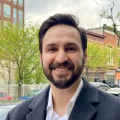 Dr. Alex Galarza is an IT Project Manager at GDC IT Solutions of Chambersburg, PA. He has a PhD in Latin American History and Anthropology from Michigan State University. He has worked as an immigration law firm director, digital scholarship librarian, and CLIR postdoctoral fellow. His research areas include soccer and politics in Buenos Aires and Cold War violence in Guatemala. He is a Fulbright Scholar, FIFA João Havelange Scholar, and the co-founder of gradhacker.org.
Dr. Alex Galarza is an IT Project Manager at GDC IT Solutions of Chambersburg, PA. He has a PhD in Latin American History and Anthropology from Michigan State University. He has worked as an immigration law firm director, digital scholarship librarian, and CLIR postdoctoral fellow. His research areas include soccer and politics in Buenos Aires and Cold War violence in Guatemala. He is a Fulbright Scholar, FIFA João Havelange Scholar, and the co-founder of gradhacker.org.
1pm // Session 2 // Humanities Engage Career Allies Roundtable
Featuring:
Dr. Kirsten Strayer is a visiting Instructor and the Program Coordinator for the ASC film festival and programming SCREENSHOT: Asia. Dr. Strayer received her BA from Georgetown University and her PhD from the University of Pittsburgh. Dr. Strayer has worked on several film festivals and screening programs, including the Silk Screen Film Festival in Pittsburgh and the Imagine Science Film Festival in New York/Abu Dhabi. She also teaches the “Film Festivals and Industry” course in the Pitt Film and Media Studies program.
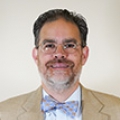 Dr. Jason Rampelt earned his PhD in the History and Philosophy of Science at Cambridge University. His current role is History of Science and Medicine Archivist at the University Library System (ULS) in Pittsburgh. Despite challenges in securing traditional academic positions, Jason was able to leverage his skills and interests to succeed in various roles, ultimately discovering a passion for archival work that aligned well with his background and expertise.
Dr. Jason Rampelt earned his PhD in the History and Philosophy of Science at Cambridge University. His current role is History of Science and Medicine Archivist at the University Library System (ULS) in Pittsburgh. Despite challenges in securing traditional academic positions, Jason was able to leverage his skills and interests to succeed in various roles, ultimately discovering a passion for archival work that aligned well with his background and expertise.
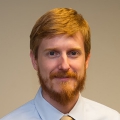 Dr. Joel Brady is the Manager of the Center for Mentoring. He works on a programmatic level with faculty, administrators, and graduate/professional students throughout the university to foster a culture of mentoring at Pitt, through programs such as the Mentoring Academy (a semester long professional development series for mentors) and Mentee Best Practices. Formerly, as Teaching Consultant and Program Supervisor of the Graduate Student Teaching Initiative for over ten years, he taught the three-credit “University Teaching Practicum,” facilitated a wide variety of pedagogy workshops, and coordinated the University-wide New Teaching Assistant Orientation (NTAO). Additionally, Dr. Brady teaches his own courses through the Departments of Religious Studies, Slavic Languages and Literatures, and History, including “History of Orthodox Christianity,” “Religions of the West,” and “Vampire: Blood and Empire.”
Dr. Joel Brady is the Manager of the Center for Mentoring. He works on a programmatic level with faculty, administrators, and graduate/professional students throughout the university to foster a culture of mentoring at Pitt, through programs such as the Mentoring Academy (a semester long professional development series for mentors) and Mentee Best Practices. Formerly, as Teaching Consultant and Program Supervisor of the Graduate Student Teaching Initiative for over ten years, he taught the three-credit “University Teaching Practicum,” facilitated a wide variety of pedagogy workshops, and coordinated the University-wide New Teaching Assistant Orientation (NTAO). Additionally, Dr. Brady teaches his own courses through the Departments of Religious Studies, Slavic Languages and Literatures, and History, including “History of Orthodox Christianity,” “Religions of the West,” and “Vampire: Blood and Empire.”
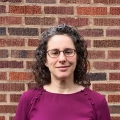 Dr. Emily Rook-Koepsel is the author of 2019 Democracy and Unity in India: Understanding the All India Phenomenon, 1940-1960 and the forthcoming Modern Indian History. In her role as the Assistant Director for Academic Affairs at the Asian Studies Center at the University of Pittsburgh, Emily works with students, faculty, and staff to build interest and scholarship about Asia, while also teaching in several programs. She builds partnerships, programming, and academic offerings at Pitt in Asian Studies. Before joining the University of Pittsburgh’s Asian Studies Center, Emily was the Wick Cary Assistant Professor of Modern South Asia at the University of Oklahoma. She has taught, presented, and published on issues of gendered citizenship, caste violence, and censorship in India. Her most recent article considers the role social work played in creating and undermining gendered citizenship for women in 1950s India.
Dr. Emily Rook-Koepsel is the author of 2019 Democracy and Unity in India: Understanding the All India Phenomenon, 1940-1960 and the forthcoming Modern Indian History. In her role as the Assistant Director for Academic Affairs at the Asian Studies Center at the University of Pittsburgh, Emily works with students, faculty, and staff to build interest and scholarship about Asia, while also teaching in several programs. She builds partnerships, programming, and academic offerings at Pitt in Asian Studies. Before joining the University of Pittsburgh’s Asian Studies Center, Emily was the Wick Cary Assistant Professor of Modern South Asia at the University of Oklahoma. She has taught, presented, and published on issues of gendered citizenship, caste violence, and censorship in India. Her most recent article considers the role social work played in creating and undermining gendered citizenship for women in 1950s India.
Dr. Patrick Hughes earned his PhD in Religious Studies from the University of Pittsburgh in 2013. He currently serves as the Assistant Director for the National Consortium for Teaching About Asia (NCTA) within Pitt's Asian Studies Center. Patrick's role involves working with K-12 educators across an 11-state region to enhance their understanding of East Asia through workshops, courses, and seminars.
Thursday, May 2
Session 3 // Teaching Innovation Presentation + Workshop
Featuring:
Alison (Ali) Patterson PhD is a Teaching Professor in the Department of English and Film and Media Studies Program at the University of Pittsburgh. Her research interests include history on film, animation, digital media and multimodal composition, and disability studies. Her most recent publications and presentations concern critical making in the Film and Media Studies classroom, and animation and disability.
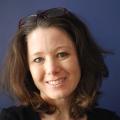 Dr. Gretchen Bender is a Teaching Professor in the History of Art and Architecture department. Having served as an academic advisor, director of undergraduate studies, assistant chair, and assistant dean, she has spent decades advocating for undergraduate students and innovative and liberatory teaching practices and has focused on curricular development. She launched WHAAM (Why the History of Art and Architecture Matters) several years ago as a public humanities project and is currently authoring an OER anti-textbook, How to Talk with a Work of art.
Dr. Gretchen Bender is a Teaching Professor in the History of Art and Architecture department. Having served as an academic advisor, director of undergraduate studies, assistant chair, and assistant dean, she has spent decades advocating for undergraduate students and innovative and liberatory teaching practices and has focused on curricular development. She launched WHAAM (Why the History of Art and Architecture Matters) several years ago as a public humanities project and is currently authoring an OER anti-textbook, How to Talk with a Work of art.
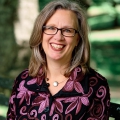 The compositions of Dr. Amy Williams have been presented at renowned contemporary music venues in the United States, Australia, Asia and Europe by leading contemporary music soloists and ensembles, including the Pittsburgh Symphony Orchestra, Buffalo Philharmonic Orchestra, JACK Quartet, Bent Frequency, Ensemble Musikfabrik, Wet Ink, Talujon, International Contemporary Ensemble, Junction Trio. Orpheus, pianist Ursula Oppens, soprano Tony Arnold and bassist Robert Black. Her pieces appear on the Albany, Parma, VDM (Italy), Blue Griffin, Centaur and New Ariel labels. As a member of the Bugallo-Williams Piano Duo, Ms. Williams has performed throughout Europe and the Americas and recorded six critically-acclaimed CDs for Wergo (works of Nancarrow, Stravinsky, Varèse/Feldman and Kurtág), as well as appearing on the Neos and Albany labels. Ms. Williams has been awarded a Howard Foundation Fellowship, Fromm Music Foundation Commission, Guggenheim Fellowship, Koussevitsky Music Foundation Commission, two awards from the American Academy of Arts and Letters, a Fulbright Scholars Fellowship to Ireland and a MacDowell fellowship. Ms. Williams holds a Ph.D. in composition from the University at Buffalo, where she also received her Master's degree in piano performance. She has taught at Bennington College and Northwestern University and is currently Professor of Composition at the University of Pittsburgh. She is Artistic Director of the New Music On The Point Festival in Vermont.
The compositions of Dr. Amy Williams have been presented at renowned contemporary music venues in the United States, Australia, Asia and Europe by leading contemporary music soloists and ensembles, including the Pittsburgh Symphony Orchestra, Buffalo Philharmonic Orchestra, JACK Quartet, Bent Frequency, Ensemble Musikfabrik, Wet Ink, Talujon, International Contemporary Ensemble, Junction Trio. Orpheus, pianist Ursula Oppens, soprano Tony Arnold and bassist Robert Black. Her pieces appear on the Albany, Parma, VDM (Italy), Blue Griffin, Centaur and New Ariel labels. As a member of the Bugallo-Williams Piano Duo, Ms. Williams has performed throughout Europe and the Americas and recorded six critically-acclaimed CDs for Wergo (works of Nancarrow, Stravinsky, Varèse/Feldman and Kurtág), as well as appearing on the Neos and Albany labels. Ms. Williams has been awarded a Howard Foundation Fellowship, Fromm Music Foundation Commission, Guggenheim Fellowship, Koussevitsky Music Foundation Commission, two awards from the American Academy of Arts and Letters, a Fulbright Scholars Fellowship to Ireland and a MacDowell fellowship. Ms. Williams holds a Ph.D. in composition from the University at Buffalo, where she also received her Master's degree in piano performance. She has taught at Bennington College and Northwestern University and is currently Professor of Composition at the University of Pittsburgh. She is Artistic Director of the New Music On The Point Festival in Vermont.
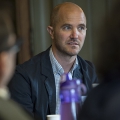 Dr. Dan Kubis teaches in the composition and literature programs. In both, he teaches at all levels, from Seminar in Composition and Introduction to Literature to capstone courses. In Pitt’s Humanities Center, where he worked from 2016 to 2020, he expanded public programming and began the Public Humanities Fellows program, which creates positions with local cultural institutions for Pitt graduate students in the humanities.
Dr. Dan Kubis teaches in the composition and literature programs. In both, he teaches at all levels, from Seminar in Composition and Introduction to Literature to capstone courses. In Pitt’s Humanities Center, where he worked from 2016 to 2020, he expanded public programming and began the Public Humanities Fellows program, which creates positions with local cultural institutions for Pitt graduate students in the humanities.
From 2015-2022, he hosted the Being Human podcast, which featured monthly interviews with artists and scholars in the humanities. He also reviews books frequently for the Pittsburgh Post-Gazette, Boston Globe, Chicago Review of Books, and more. Dan received a PhD in English from Pitt, an MA in philosophy from the University of Illinois-Chicago, and a BA in philosophy and architectural studies from Pitt.
 Dr. Dana Och is a Teaching Professor in the English Department, Director of Undergraduate Studies for Film and Media Studies (critical studies), affiliated faculty with Gender, Sexuality, and Women's Studies, and a current member of the Advisory Council on Instructional Excellence. She received the Tina and David Bellet Award for Excellence in Teaching in 2022.
Dr. Dana Och is a Teaching Professor in the English Department, Director of Undergraduate Studies for Film and Media Studies (critical studies), affiliated faculty with Gender, Sexuality, and Women's Studies, and a current member of the Advisory Council on Instructional Excellence. She received the Tina and David Bellet Award for Excellence in Teaching in 2022.
In addition to a recent publication on implementing Universal Design for Learning into online courses during the pandemic, she writes frequently on questions of genre, Irish cinema, cult, and horror, including publications on Neil Jordan’s Irish horror films, the post-colonial zombie comedy, the neopostmodern horror film, transnational horror circulation in Rare Exports. and the gendered reception of Twin Peaks, Pretty Little Liars, Fifty Shades of Grey, and Breaking Bad. She co-edited the anthology Transnational Horror Across Visual Media: Fragmented Bodies (Routledge 2014).
1pm // Session 4 // "Integrating Professional Development into Graduate Curricula"
Featuring:
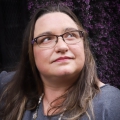
Dr. Stacy Hartman is a researcher, facilitator, writer, project manager, and consultant with expertise in PhD professional development, humanities curriculum (re)design, and the intersection of the public and academic humanities. From 2018-2023, she served as the director of the PublicsLab at the Graduate Center, City University of New York. Prior to that, Dr. Hartman was the project manager of the Modern Language Association's Connected Academics project. She is the co-editor of Graduate Education for a Thriving Humanities Ecosystem (Modern Language Association, 2023). She holds a PhD in German Studies from Stanford University. Learn more about her work at stacyhartman.com

